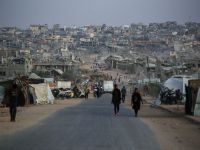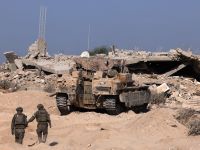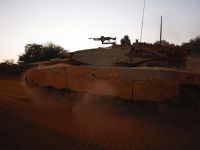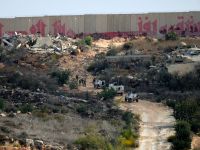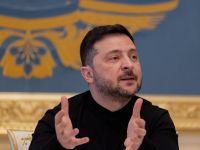US Secretary of State Madeleine Albright met here Monday with reclusive North Korean leader Kim Jong-Il in historic talks marking the first time an American official has ever met the Stalinist nation's chief.
Albright and Kim Jong-Il greeted each other with smiles and handshakes in an ornate, high-ceilinged building at the guesthouse compound where the secretary is staying and after three hours of talks, agreed to meet again on Tuesday, State Department spokesman Richard Boucher said.
He declined to identify specific issues covered in the talks, which were to continue at a dinner later Monday but said the second round, which had not been originally expected, had been decided upon because "they have more to talk about."
Albright also presented Kim Jong-Il with a letter from US President Bill Clinton that "generally dealt with the exploration of how to further develop relations with North Korea," Boucher told reporters.
He declined to comment on the substance of the Clinton letter, but made clear that one topic of conversation between Albright and the North Korean officials she met on Monday, had been Kim Jong-Il's invitation to the president to visit North Korea before the end of his term.
"They were discussing issues of concern to the United States and being able to deal with these issues is the key to having a visit by the president," Boucher said, refusing to comment further.
Also of great concern to Washington is North Korea's missile program and judging the credibility of Kim Jong-Il's purported offer to abandon his missile program in exchange for commercial satellite launches.
Boucher would not comment on the missile issue, nor would he say whether the North's suspect nuclear programs or terrorism, of particular concern to Pyongyang which wants to be removed from the State Department's list of state sponsors of terrorism, had come up.
From outward appearances, Albright and Kim Jong-Il appeared to get along well together with the Great Leader deciding to take over from his number two as host of the dinner and Albright accepting his invitation to be a guest at a gala spectacle in one of Pyongyang's cavernous stadiums.
The performance, in honor of the Korean communist party's 55th anniversary featured close to 100,000 dancers, singers and musicians and was watched by a crowd of more than 50,000. Both performers and audiences erupted into frenzied applause and screams when Kim Jong-Il walked in to take his seat.
Earlier, as they began their meeting, Kim Jong-Il noted the groundbreaking nature of Albright's trip.
"This is a new one from a historical point of view and I am very happy," he said through an interpreter, before sitting down across a large table with the secretary.
"Mr Chairman, it's a pleasure, I am very glad to be here," Albright replied.
US officials have warned not to expect any significant breakthroughs during Albright's two-day visit, they say they believe "serious progress" can be made in addressing Washington's concerns, including on missiles.
"We have reason to believe, because of the discussions that we have had, that North Korea may be prepared to take some very serious steps," one senior official told reporters traveling with Albright.
"Based on the discussions that we have had ... we believe there is the possibility of some serious progress on issues of major concern to us," the official said on condition of anonymity.
But even as Albright arrived under gray skies, the North Koreans had moved quickly to imprint their agenda on her visit, scheduling a courtesy call on Jo Myong Rok at the enormous palace honoring Kim Jong-Il's father, the late "Great Leader" Kim Il-Sung whose embalmed body lies in state there.
The elder Kim played a key role in the 1950-53 Korean War that pitted a US- and South Korean-led United Nations force against the communist North and China. Under his rule, North Korea remained closed to the outside world, earning it the title of the hermit state.
Albright's presence at the Kim Il-Sung memorial had the potential to raise the ire of not only of Washington's allies in Seoul, but also US veterans of the Korean conflict who lost tens of thousands of their fellow soldiers.
The mausoleum trip was closed to the press and a senior US official stressed that Albright had only "stopped briefly" in front of the bier where Kim Il-Sung's body lies and did not place flowers before it.
After meeting Jo, Albright visited a kindergarten that also serves as a distribution point for World Food Program assistance, dancing with brightly dressed four- to six-year-olds.
She praised the children for their skill but also delivered a blunt message to the North Korean leadership which has often been accused of redirecting foreign food aid to its armed forces.
"International donors should be assured that the supplies they send are used for the purposes intended," Albright said.
Her arrival in Pyongyang came less than 24 hours after diplomatic drama surrounding North Korea's opening up to the world intensified with the arrival of Chinese defence minister Chi Haotian -- PYONGYANG (AFP)
© 2000 Al Bawaba (www.albawaba.com)



